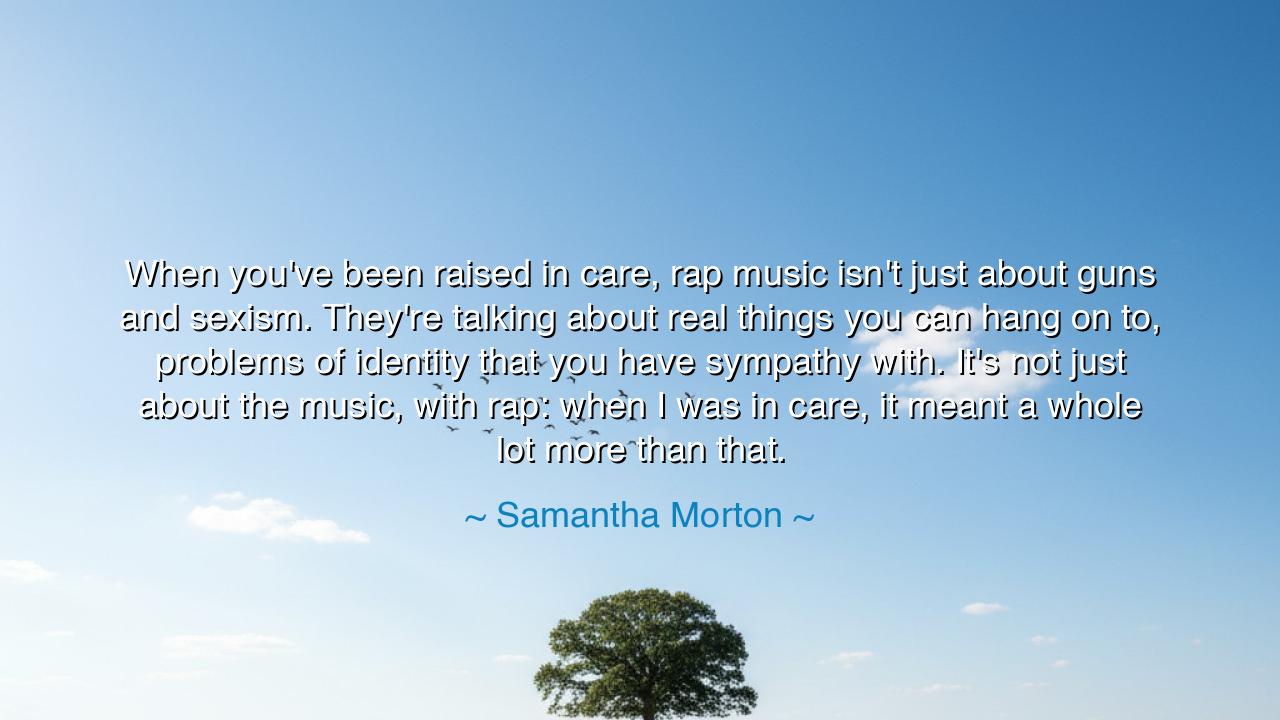
When you've been raised in care, rap music isn't just about guns
When you've been raised in care, rap music isn't just about guns and sexism. They're talking about real things you can hang on to, problems of identity that you have sympathy with. It's not just about the music, with rap: when I was in care, it meant a whole lot more than that.






Gather close, children of the future, for the words of those who have walked through the fires of life often carry lessons that shine brighter than any tale of distant kings or heroes. Samantha Morton, a woman whose life was shaped by adversity, once spoke with a deep understanding of the power of rap music: "When you've been raised in care, rap music isn't just about guns and sexism. They're talking about real things you can hang on to, problems of identity that you have sympathy with. It's not just about the music, with rap: when I was in care, it meant a whole lot more than that." In these words, Morton reveals how art—music, in this case—is not just a form of entertainment, but a lifeline, a way of speaking to the soul and providing meaning to a world that can often feel cold and disconnected.
In the ancient world, artists were often the voices of the oppressed, the ones who spoke truths that others would not dare to utter. The bards of the Greek world sang of warriors and gods, but they also told the stories of the common people, the struggles of everyday lives, and the complexities of identity and belonging. These tales, though wrapped in myth and legend, spoke to the deep human emotions that tied all people together. In the same way, rap music—especially for those raised in difficult circumstances—becomes more than mere rhythm and rhyme. It becomes a language of survival, a mirror for the pain and hope that lie deep within the heart.
Consider the story of Homer, the great poet of ancient Greece, whose epics were not just tales of gods and battles, but reflections of the struggles faced by ordinary people. Odysseus, though a mighty hero, was also a man who faced profound questions of identity and belonging as he journeyed through a world that was hostile and unpredictable. The Odyssey is not merely a story of war and adventure—it is a story of self-discovery, of finding one’s place in a world that often seems without meaning. Samantha Morton’s words reflect the same deep longing for identity and belonging that Homer captured in his epics. Just as Odysseus sought his home, so too do those raised in care seek a place where they can feel seen, understood, and valued.
In rap music, the themes of survival, identity, and belonging are often at the forefront. The struggles depicted in the lyrics are not mere stories; they are the realities of many who feel excluded, abandoned, or lost. For Morton, growing up in care, rap music was not just a soundtrack—it was a guide, a way of understanding the world and her place within it. The stories told in rap songs speak of pain, anger, and loss, but also of resilience, hope, and the search for a voice in a world that often overlooks the most vulnerable. The realness of these songs connected deeply with Morton, as they spoke to her own struggles with identity and the search for belonging.
This, children, is the great power of art—the ability to speak to the soul, to give a voice to those who feel invisible, to capture the truths of human existence in a way that is more immediate and more relatable than anything else. Whether it is through the epic tales of the ancients, or the modern lyrics of rap, art provides us with the tools to understand ourselves and the world around us. Rap music, like the ancient bards, speaks not just of superficial battles, but of the deeper internal struggles that define the human condition. It reveals the truth of what it means to be human—flawed, searching, and often in pain, but also resilient, hopeful, and capable of growth.
The lesson here, children, is that art has the power to transcend the boundaries of time and circumstance. While rap music may seem like a product of modern culture, its roots are deeply connected to the ancient need for storytelling—the need to understand oneself and the world. Just as the ancients used their art to tell the stories of their times, so too must we use our creative gifts to express the truths of our lives. When we listen to the voices of others, especially those who have been marginalized or forgotten, we find that their stories—though they may be different from our own—speak to universal human experiences of love, pain, hope, and identity.
In your own lives, I urge you to listen deeply to the stories of others. Whether through music, literature, or conversation, seek to understand the real struggles behind the words, the human connections that bind us all together. Do not dismiss the voices of those who seem different or distant from you; their struggles are often the same struggles you carry within. Just as rap music gave Morton a sense of identity and belonging, so too can we find strength and understanding in the stories of others. Seek the truth behind the surface, and recognize the power of art to heal, to teach, and to connect us all. In doing so, you will learn the greatest lesson of all: that humanity is bound together by its shared struggles and shared dreams.






AAdministratorAdministrator
Welcome, honored guests. Please leave a comment, we will respond soon